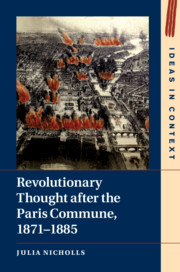Book contents
- Revolutionary Thought after the Paris Commune, 1871–1885
- Ideas in Context
- Revolutionary Thought after the Paris Commune, 1871–1885
- Copyright page
- Contents
- Acknowledgements
- Introduction
- Part I The Paris Commune and Accounting for Failure
- Part II Revolution and the Republic
- Part III Marx, Marxism, and International Socialism
- Part IV Empire and Internationalism
- Conclusion
- Bibliography
- Index
- Ideas in Context
Introduction
Published online by Cambridge University Press: 12 July 2019
- Revolutionary Thought after the Paris Commune, 1871–1885
- Ideas in Context
- Revolutionary Thought after the Paris Commune, 1871–1885
- Copyright page
- Contents
- Acknowledgements
- Introduction
- Part I The Paris Commune and Accounting for Failure
- Part II Revolution and the Republic
- Part III Marx, Marxism, and International Socialism
- Part IV Empire and Internationalism
- Conclusion
- Bibliography
- Index
- Ideas in Context
Summary
The introduction highlights the significant role that revolution played in French political thought during the nineteenth century and identifies the historiographical gaps that this study will fill. Rather than fading into obscurity after 1871, revolutionaries remained active and sought, relatively successfully, to re-establish a viable ‘revolutionary’ position in French politics and society. This was achieved through intellectual experimentation rather than unifying behind a single revolutionary voice. From 1789 to the mid-1880s, successive generations of activists sought to reinvent continuities with their predecessors, drawing upon new ideas to invest familiar terms such as equality and solidarity with fresh meanings more appropriate to their circumstances. There was no fixed ‘revolutionary tradition’ in France during the nineteenth century: rather, it was a process of perpetual intellectual adaptation.
Keywords
- Type
- Chapter
- Information
- Revolutionary Thought after the Paris Commune, 1871–1885 , pp. viii - 18Publisher: Cambridge University PressPrint publication year: 2019

